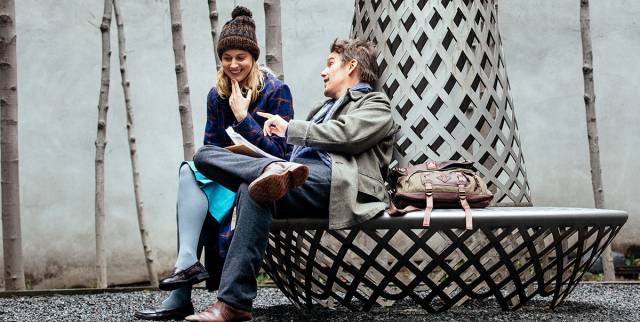
 Maggie’s Plan is a charming film that uses the warm and antic tone of a romantic comedy to tell a story that questions the underpinnings of that genre. It’s familiar and unfamiliar in welcome measures and one of the funniest satires of narcissistic academics in some time. At the film’s onset, Maggie (Greta Gerwig) has a plan: to raise a child by herself. An administrator at the New School who acts as “a bridge between art and commerce” for grad students, she herself was raised by a single parent, feels ready, and does not want to wait on a relationship that may never come. To that end, she selects her college classmate and “pickle entrepreneur” Guy (Travis Fimmel) to be a donor. The plan changes, however, when she meets John (Ethan Hawke), a teacher specializing in “ficto-critical anthropology.” John is married, but feels neglected by his wife Georgette (Julianne Moore), an even more prominent and intimidating academic. John wants to write fiction and Maggie supports him, until they fall for each other.
Maggie’s Plan is a charming film that uses the warm and antic tone of a romantic comedy to tell a story that questions the underpinnings of that genre. It’s familiar and unfamiliar in welcome measures and one of the funniest satires of narcissistic academics in some time. At the film’s onset, Maggie (Greta Gerwig) has a plan: to raise a child by herself. An administrator at the New School who acts as “a bridge between art and commerce” for grad students, she herself was raised by a single parent, feels ready, and does not want to wait on a relationship that may never come. To that end, she selects her college classmate and “pickle entrepreneur” Guy (Travis Fimmel) to be a donor. The plan changes, however, when she meets John (Ethan Hawke), a teacher specializing in “ficto-critical anthropology.” John is married, but feels neglected by his wife Georgette (Julianne Moore), an even more prominent and intimidating academic. John wants to write fiction and Maggie supports him, until they fall for each other.
However, this is only the first act and the film jumps forward a few years to find Maggie raising her child with John along with John and Georgette’s two older children. While meeting Maggie, John espoused a theory that every relationship has a gardener and a rose, and with good-natured and practical Maggie in his life taking care of things, John has seized the opportunity to switch roles and indulge himself. Maggie suspects that John and Georgette still have feelings for each other and a new plan forms in her head as she wonders if everything could go back to how it was.
First, a warning – Maggie’s Plan takes place in academia and outdoes even Woody Allen (though probably not Whit Stillman) in tossing off arch intellectual one-liners, so stay away if you don’t want to hear characters flirt using lines like “nobody unpacks commodity fetishism the way you do.” But writer/director Rebecca Miller knows that these polished academic facades usually fail to hide messy human emotions underneath, which she uncovers with madcap glee. The cast is wonderful – Gerwig and Hawke are both endearing without hiding their characters’ flaws and the film has ringers like Maya Rudolph and Bill Hader in smaller roles. But it’s probably Julianne Moore, in a thick Scandinavian accent and wardrobe, who stands out the most, transforming in Maggie’s eyes from an overbearing intellectual to a vulnerable friend as she goes from the other woman to a co-parent, even while Georgette dedicates her new book “Bring Back the Geisha” to Maggie – “the woman who ruined my life.”
Maggie’s Plan is firmly comedic – quickly paced, stuffed with jokes – but it’s always humane as well, never taking its characters’ desires for granted or making anyone a villain. It casts doubt on the entire premise of romantic comedies by reaching the “happy ending” thirty minutes into the film and then watching it unravel, resulting in a smart, fun film that asks if maybe some people need a different kind of happy ending.